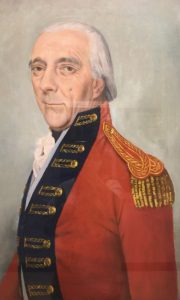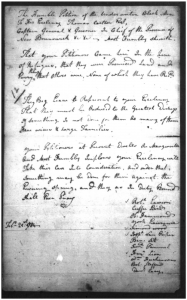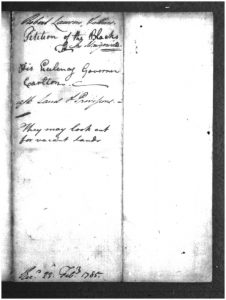The Blacks of Maugerville
“… your petitioners came here in the line of refugees, that they were promised land and every thing that others were, none of which they have rec’d. They beg leave to represent to your Excellency that they must be reduced to the greatest distress if something is not done for them as many of them have wives & large families…”
– Robert Lawson and 11 others, Maugerville, 1785
For those who were “free”, there were great cruelties attached to their so-called freedom; a case in point is the “Blacks of Maugerville”. In 1785, Robert Lawson and eleven others living in Maugerville wrote a petition to the Governor of New Brunswick, Thomas Carleton. Their petition expresses desperation and frustration that they had not been granted the land they were promised to start their new lives in New Brunswick.
These men were all Black Loyalists, free men, and refugees, who all escaped the American Revolutionary War and immigrated to New Brunswick with the promise of starting anew. Six were listed in the Book of Negroes as former slaves; three of whom traveled together on the same ship, The Bridgewater, bound for the river St John in 1783.
The popular New Brunswick narrative of a Loyalist journey—and “hope restored”—suggests a story of people who escaped persecution, moving to a new promised land. This was not the experience for Robert Lawson and the “Blacks of Maugerville”. Although the British government promised white Loyalists 100 acres upwards to 1,000 acres to start their new lives, Black Loyalists, free men, and refugees were only granted 50 acres, and preference was given to those who had served in the military. In addition, to obtain more than 50 acres, Black settlers had to prove they could cultivate their acreage, before they could receive more. Such restrictions did not apply to white Loyalists.

“Portrait of Thomas Carleton, first Lieutenant-Governor of New Brunswick” by Unknown artist. Oil on canvas, date unknown.
The “Blacks of Maugerville” – Richard Lawson, Cuffe Bird, Obijah Hammond, York Lawrence, Bob Stafford, Daniel Cary, Simond Wood, Joseph Van Riper, Benjamin Sith, Samuel Pammel, Frances Lion, and William Hutchinson – never received the land they requested.
Their petition was written in February and shows concern for the coming spring. Clearly the winter was difficult for the families, and supplies were running low, making starvation a real possibility. Nevertheless, the final decision from Governor Carleton is written on the back of their request: “They may look out for vacant lands”.



